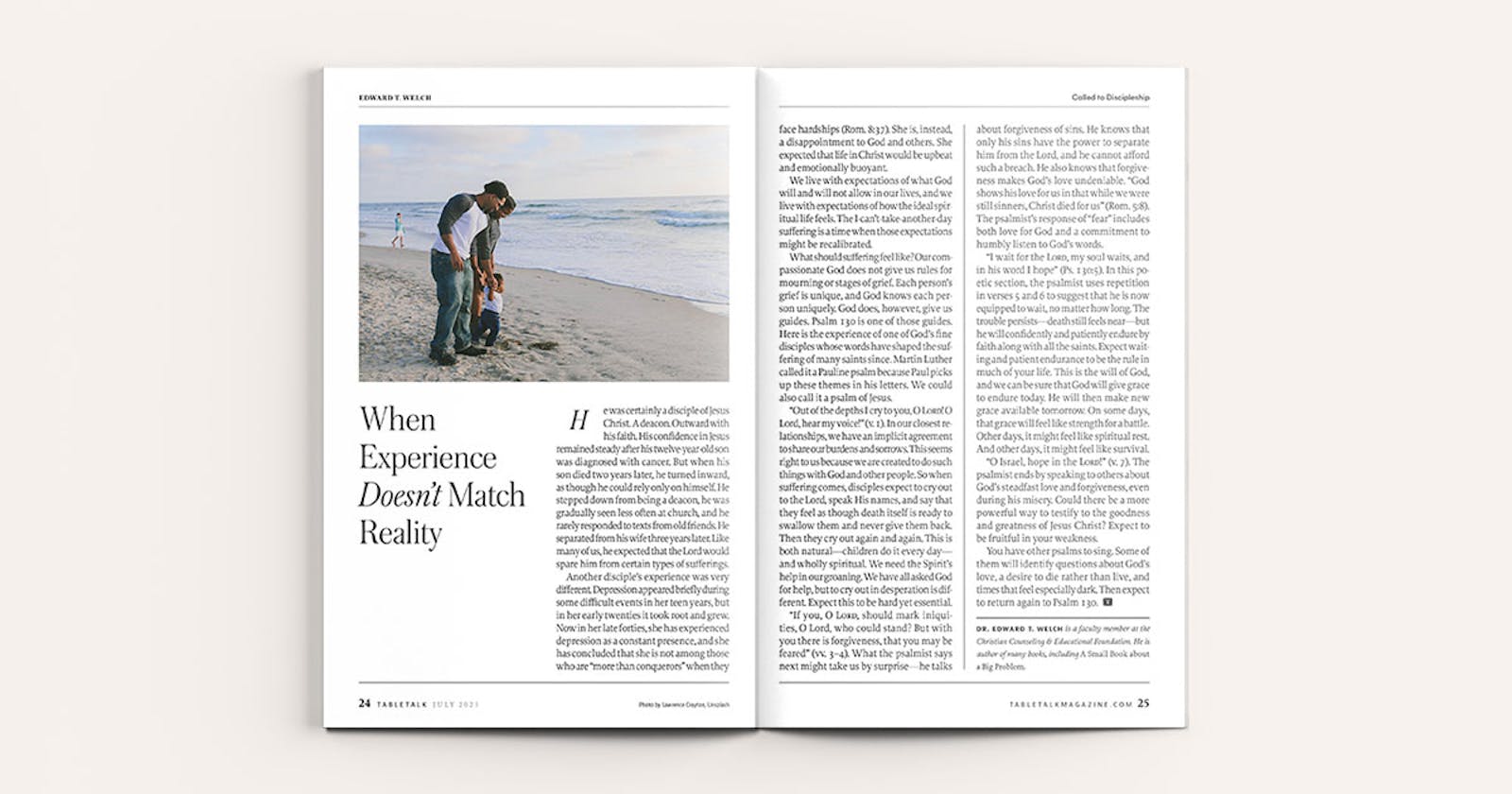
Request your free, three-month trial to Tabletalk magazine. You’ll receive the print issue monthly and gain immediate digital access to decades of archives. This trial is risk-free. No credit card required.
Try Tabletalk NowAlready receive Tabletalk magazine every month?
Verify your email address to gain unlimited access.
He was certainly a disciple of Jesus Christ. A deacon. Outward with his faith. His confidence in Jesus remained steady after his twelve-year-old son was diagnosed with cancer. But when his son died two years later, he turned inward, as though he could rely only on himself. He stepped down from being a deacon, he was gradually seen less often at church, and he rarely responded to texts from old friends. He separated from his wife three years later. Like many of us, he expected that the Lord would spare him from certain types of sufferings.
Another disciple’s experience was very different. Depression appeared briefly during some difficult events in her teen years, but in her early twenties it took root and grew. Now in her late forties, she has experienced depression as a constant presence, and she has concluded that she is not among those who are “more than conquerors” when they face hardships (Rom. 8:37). She is, instead, a disappointment to God and others. She expected that life in Christ would be upbeat and emotionally buoyant.
We live with expectations of what God will and will not allow in our lives, and we live with expectations of how the ideal spiritual life feels. The I-can’t-take-another-day suffering is a time when those expectations might be recalibrated.
What should suffering feel like? Our compassionate God does not give us rules for mourning or stages of grief. Each person’s grief is unique, and God knows each person uniquely. God does, however, give us guides. Psalm 130 is one of those guides. Here is the experience of one of God’s fine disciples whose words have shaped the suffering of many saints since. Martin Luther called it a Pauline psalm because Paul picks up these themes in his letters. We could also call it a psalm of Jesus.
“Out of the depths I cry to you, O Lord! O Lord, hear my voice!” (v. 1). In our closest relationships, we have an implicit agreement to share our burdens and sorrows. This seems right to us because we are created to do such things with God and other people. So when suffering comes, disciples expect to cry out to the Lord, speak His names, and say that they feel as though death itself is ready to swallow them and never give them back. Then they cry out again and again. This is both natural—children do it every day—and wholly spiritual. We need the Spirit’s help in our groaning. We have all asked God for help, but to cry out in desperation is different. Expect this to be hard yet essential.
“If you, O Lord, should mark iniquities, O Lord, who could stand? But with you there is forgiveness, that you may be feared” (vv. 3–4). What the psalmist says next might take us by surprise—he talks about forgiveness of sins. He knows that only his sins have the power to separate him from the Lord, and he cannot afford such a breach. He also knows that forgiveness makes God’s love undeniable. “God shows his love for us in that while we were still sinners, Christ died for us” (Rom. 5:8). The psalmist’s response of “fear” includes both love for God and a commitment to humbly listen to God’s words.

“I wait for the Lord, my soul waits, and in his word I hope” (Ps. 130:5). In this poetic section, the psalmist uses repetition in verses 5 and 6 to suggest that he is now equipped to wait, no matter how long. The trouble persists—death still feels near—but he will confidently and patiently endure by faith along with all the saints. Expect waiting and patient endurance to be the rule in much of your life. This is the will of God, and we can be sure that God will give grace to endure today. He will then make new grace available tomorrow. On some days, that grace will feel like strength for a battle. Other days, it might feel like spiritual rest. And other days, it might feel like survival.
“O Israel, hope in the Lord!” (v. 7). The psalmist ends by speaking to others about God’s steadfast love and forgiveness, even during his misery. Could there be a more powerful way to testify to the goodness and greatness of Jesus Christ? Expect to be fruitful in your weakness.
You have other psalms to sing. Some of them will identify questions about God’s love, a desire to die rather than live, and times that feel especially dark. Then expect to return again to Psalm 130.
